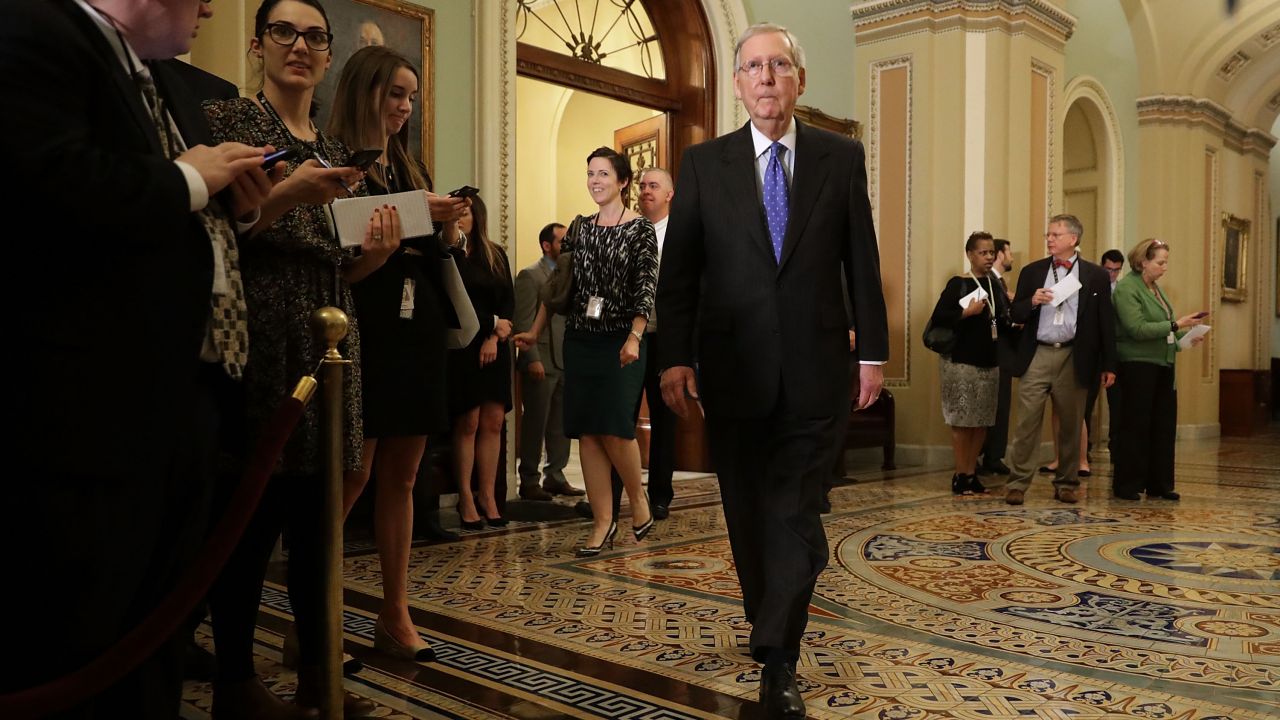
Senate Majority Leader Mitch McConnell (R-KY) on April 4, 2017. (Photo by Chip Somodevilla/Getty Images)
This article is adapted from Unsanitized: The COVID-19 Daily Report put out by The American Prospect. You can find the original publication here.
First Response
All the momentum for a year-end COVID relief deal made contact with reality yesterday, and in today’s Washington that means a stall-out. Congress will have to work through the weekend (without overtime pay?? The shame) and there’s probably going to be a short government shutdown, the third (I think) of the Trump presidency. Mitch McConnell went back to scheduling nominations for executive branch positions.
A deal looks imminent and also not imminent at the same time. Here are the outstanding issues:
Checks: Donald Trump bum-rushed the negotiations yesterday, demanding broad-based payments more than three times as much as the $600 for adults now on the table. Aides talked him out of it. It’s hard to argue with his point! If you’re going to do broad-based relief—and there are reasons to do it, to get at non-working and poor people that unemployment insurance won’t reach—it should at least come close to covering even a month’s rent.
The issue in negotiations appears to be eligibility. Millions of mixed-status families did not get a CARES Act payment because of eligibility rules that required everyone in a household to be a U.S. citizen. Democratic leaders are trying to alter this so only one member of a household with a Social Security number makes the household eligible. Meanwhile, almost 9 million non-tax filers who were eligible for a check last time haven’t received one; mechanisms to ensure their participation need to be discussed. And I spoke yesterday with Scott Roberts of Color of Change, which has been highlighting another sub-group that has struggled to get checks: incarcerated people.
There was no language on this in the CARES Act, making incarcerated people eligible. But the IRS tried to block them from receiving payments anyway. State corrections departments were intercepting checks intended for people in prison. A federal judge ordered that these payments get made in September, but that set up an application process. Color of Change has been helping get people through it; of course there are fees associated with flowing money into prison bank accounts, which should be waived.
On this bill, “one would hope we wouldn’t have to do anything,” Roberts told me. “Everything we’re building is with the intention in mind that there will be at least one more wave (of checks).” It’s just another example of the lack of value placed on incarcerated people’s lives; the IRS hasn’t intervened to exclude any other class of eligible people from payments. So care must be taken to make sure as many people get the relief as possible. Of course this costs more, so that’s the fight.
Robbing Peter: There’s a lot of grumbling, from economists in particular, about how making room for checks ended up cutting the length of extended and enhanced unemployment, which is now down to 10 weeks from 16. Again, there is no reason to have pitted both of these types of relief, which have their place, against one another. The balancing act is predicated on a hard line at $900 billion that Democrats are currently honoring, even though Republicans, worried about Georgia, appear desperate to get a bill. Even despite that McConnell is getting most of what he wants out of it. I’m not in the room, but that bluff should at least be called. Shrinking the UI length is unacceptable.
State and local aid: There is none, but Democrats seem to be trying to plus-up certain earmarked budgets in a way that would stand in for that aid. They’ve asked for $30 billion for governors to control for health care and vaccine distribution; Republicans have rejected that so far. There’s also money given to FEMA for state and local “emergencies,” (isn’t every budget shortfall an emergency?) which the last I saw was $90 billion. But Republicans are also resisting a separate pot of just $1 billion for FEMA, so they’re clearly targeting that.
Save our Stages: This is legislation for entertainment venues; Democrats want $17 billion. Both sides want to broaden the definition to include zoos and museums. This will probably affect the level of PPP funding; whether to fold this all into one number or to segregate some money for entertainment and leisure.
The money cannon: This is frankly the dumbest point of contention. Sen. Pat Toomey (R-PA) wants to rescind the authority for the Federal Reserve’s corporate credit facilities, reducing the flexibility for the incoming Biden administration’s Fed to lend to medium-sized businesses or state and local governments. This is now being termed the main stumbling block to a deal.
The Fed has had nine months to use that lending authority, and they’ve done next to nothing with it. The “Main Street Lending Program” is mostly an oil and gas lending program. The state and local lending has yielded two loans, and the Fed leadership appears ideologically opposed (and conflicted with the muni bond industry) to doing more. Furthermore, the Fed has the tools to undertake this lending anyway, through Section 14(2) authority.
Yet Democrats are going to great lengths to paint Steven Mnuchin as a schemer (hey if the shoe fits) bent on sabotaging the next president. Republicans don’t exactly have good intentions here, but the Fed’s actions haven’t really done much for regular people, either. Thanks in part to propped-up asset prices, 45 of the 50 biggest companies made money during the pandemic, laid off workers and leaked cash out to shareholders. Corporate bond-buying has pushed investors to seek high returns, and is facilitating private equity dividend recapitalizations, another extraction tool to loot companies.
These facilities will not be missed. They have almost exclusively fattened the wallets of the investor class, and there’s no reason to think they would suddenly benefit the average worker. Especially when, rhetorically speaking, proceeds from the money cannon are being distributed to people who need it. I can’t think of anything less worth fighting for.
Unemployment Tax Update
Just to follow up on my story from yesterday about unemployment benefits being taxable, and how Congress should exempt that from happening amid the pandemic. The Wall Street Journal’s excellent tax reporter Richard Rubin reminded me that Congress did this during the Great Recession, at least partially. In the American Recovery and Reinvestment Act (the stimulus), the first $2,400 of unemployment insurance in 2009 was made exempt from tax.
Remember that the 2009 stimulus only added a meager $25 weekly boost to unemployment benefits. The $600/week this time, over a four-month period, comes to $9,600 on its own, without factoring in the standard state benefits and any additional time on unemployment. So there’s good reason, based on this precedent, to exempt a lot more unemployment benefits from taxation now. Why isn’t Congress doing this?
Days Without a Bailout Oversight Chair
266.
Today I Learned
- Something is going haywire with state expectations on the Pfizer vaccine; much less than they assumed would be allotted is going through. (Talking Points Memo)
- Meanwhile, an FDA advisory panel unanimously approved the Moderna vaccine, and I’d expect agency approval today. (Vox)
- I’m living in the biggest spread zone in America. There are no ICU beds left in southern California. (Los Angeles Times)
- Even with the “tax windfall” (mostly on capital gains), cities and states are going to be anywhere from $200 billion to $400 billion in the hole. (Bloomberg)
- One health care worker in Alaska had an allergic reaction to the vaccine, but he quickly recovered. (Washington Post)
- 2020 encapsulated: a federal Death Row inmate scheduled to be executed contracted the coronavirus. (Politico)
- White House adviser-in-waiting Cedric Richmond has the virus, along with 50 members of Congress. (Axios)
- Why are people so dead-set on a pandemic wedding? (New York Magazine)
- Former California unemployment system worker’s scam: fake being Dianne Feinstein to grab jobless benefits. (Los Angeles Times)




